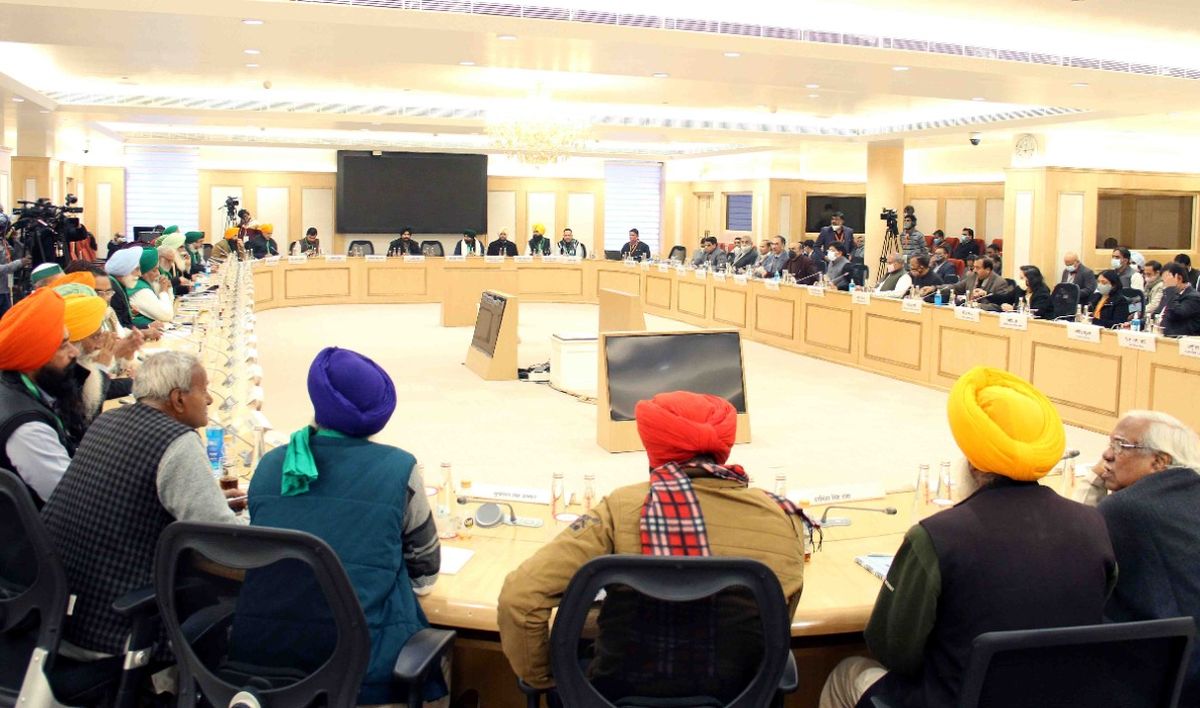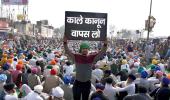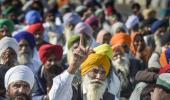The government on Friday asked protesting farmers to form an informal group to prepare a concrete proposal about their objections and suggestions on the three farm laws for further discussion at their next meeting on January 19 to end the long-running protest at various Delhi borders, but unions stuck to their main demand of a complete repeal of the three Acts.

As nearly five hours of talks between 41 unions and three central ministers did not reach a decisive stage in the ninth round of talks at Vigyan Bhawan in New Delhi, the two sides decided to meet again the next Tuesday.
Agriculture Minister Narendra Singh Tomar told farmer leaders at the meeting that the government has been flexible in its approach and urged the same from them.
Incidentally, the tenth round of talks has been scheduled for a day when a Supreme Court-appointed committee to resolve the impasse is also likely to hold its first meeting.
A day before that, the apex court is likely to hear a petition against a tractor rally call given by the protesting farmers for the Republic Day on January 26.
After the meeting, Tomar told reporters that two separate deliberations can run parallelly as the farmer unions want to continue their talks with the government and the court-appointed panel has also been set up with an aim to resolve the crisis and a solution can emerge from anywhere.
"Discussions happen at various platforms and a solution can emerge from anywhere... Our effort is to find a solution at the earliest through dialogue so that the farmers' protest ends. Farmers are sitting in cold weather amid the threat of COVID-19 and the government is concerned about that also and is therefore engaging with farmers with an open mind," he said.
The minister said the government will also present its side before the SC-appointed panel whenever it is asked to do so.
Farmer leader Joginder Singh Ugrahan said after the meeting that the unions urged the Centre to repeal the three laws, but the Centre was unwilling to do so.
Ugrahan said the union leaders also raised the issue of National Investigation Agency (NIA) raids on transporters in Punjab who are supporting farmers' protests and were providing logistic support for the agitation.
Shivkumar Kakka, national president of Rashtriya Kisan Mazdoor Mahasangh, said the union leaders raised the issue of Income Tax raids on 'arhtiyas' (commission agents) in Punjab.
"Cases were also filed against 900 Haryana farmers under IPC section 307, while the NIA raided transporters and called them for interrogation. You are taking vindictive action against those who are helping us. This is not constitutional," he said.
The farmer leader said that Tomar told them the government will look into it and see why it was happening.
Farmers union leaders, who had their own langar food during the lunch break, said at the meeting they are committed to continuing holding direct talks to resolve the over-one-month-long deadlock over three agri laws, even as a committee has been formed by the Supreme Court to resolve the deadlock.
In his opening remarks, Tomar urged farmer leaders to be flexible in their approach as has been done by the government.
Besides Tomar, Railways, Commerce and Food Minister Piyush Goyal and Minister of State for Commerce Som Parkash were part of the government side.
"Both the government and farmer unions have reaffirmed their commitment to continue with the direct dialogue process," said All India Kisan Sangharsh Coordination Committee member Kavita Kuruganti, who was part of the meeting.
"In his opening remarks, Tomar ji said you keep saying that the government is adamant and making it an issue of ego, even though we have accepted several demands. Don't you think you should be flexible and not stick to one single demand of repealing the laws," said Baljit Singh Bali of Punjab Kisan Morcha.
Farmer leader Darshan Pal said there was a good discussion on all three laws. "There is a possibility of some resolution. We are positive."
Another leader Rakesh Tikait said: "Government has told us that solution should be found through dialogue and not a court. Everyone is of the same view. There is a possibility of some solution."
Thousands of farmers, mainly from Punjab, Haryana and western Uttar Pradesh, are protesting at various border points of Delhi for over a month now against the three laws.
On January 8, the eighth round of meeting had remained inconclusive as the Centre ruled out repealing the three contentious laws claiming nationwide support for the reforms. However, farmer leaders had said that they were ready to fight till death and their 'ghar waapsi' would happen only after 'law waapsi'.
In the sixth round held on December 30 last year, some common ground was reached on two demands -- decriminalisation of stubble-burning and continuation of power subsidies.
Enacted in September 2020, the government has presented these laws as major farm reforms aimed at increasing farmers' income, but the protesting farmers have raised concerns that these legislations would weaken the minimum support price (MSP) and mandi (wholesale market) systems and leave them at the mercy of big corporations.
The government has maintained that these apprehensions are misplaced and has ruled out a repeal of the laws.
The Supreme Court on January 11 had stayed the implementation of the three laws till further orders and appointed a four-member panel to resolve the impasse.
Bhartiya Kisan Union president Bhupinder Singh Mann, however, on Thursday recused himself from the committee.
Shetkari Sanghatana (Maharashtra) president Anil Ghanwat, International Food Policy Research Institute's former director (South Asia) Pramod Kumar Joshi and agriculture economist Ashok Gulati are the other three members on the panel.
Tomar said the meeting with farmers unions was cordial and all three laws were discussed, while there was a detailed discussion on the Essential Commodities (Amendment) Act.
"During the discussion, farmers expressed their views and our minister (Goyal) also shared the details and tried to address their concerns. But the discussion did not reach to a conclusion. After that, the government and union mutually decided to meet again on January 19 at 12 noon," he said.
The minister said he hopes that unions will take forward the talks based on Friday's discussion.
"We have also suggested them to form an informal group of those who can talk properly about the laws, about expectations from the government and also about provisions of the laws that they feel are against farmers.
"If they discuss all these and come out with a draft of concrete proposals then the government is ready to discuss that with an open mind," he said.
Tomar said the government has understood farmers' apprehensions in the course of several rounds of discussion so far and had expressed its willingness to address those apprehensions and a written proposal was also sent to unions.
"But they didn't accept the proposal and therefore the discussions are happening... I hope that we will move forward towards finding a solution," he said.
On protests held by Congress party across the country and allegations levelled by Rahul Gandhi against the government with regard to the farm laws, Tomar said, "The entire Congress party also laughs at and makes fun of Rahul Gandhi's statements and action."
"I want to tell him through media that they had promised to undertake these reforms in their 2019 election manifesto. If he doesn't remember, he can read his manifesto again.
"If it is there in the manifesto, then Rahul Gandhi and Sonia Gandhi should come before the press and make it clear if they were lying then or are lying now," he said.











 © 2025
© 2025